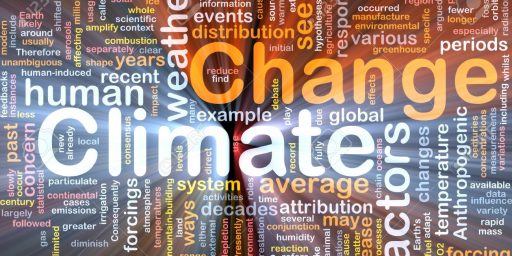Optimal Global Warming Policy
Over at Reason Online Ronald Bailey has an interesting article on global warming policy. He looks at the research of William Nordhaus that looks at economics of global climate change.
Nordhaus and his colleagues have developed a small but comprehensive model that combines interactions between the economy and climate called DICE-2007, short for Dynamic Integrated model of Climate and the Economy. Nordhaus first computes a baseline that assumes that humanity does essentially nothing to limit its output of carbon dioxide. By 2100 CO2 atmospheric concentrations would rise from the pre-industrial level 280 parts per million (ppm), to 380 ppm today, to 685 ppm in 2100. Global average temperature would rise by 2.4 degrees Celsius by 2100. In this baseline scenario, the DICE-2007 model estimates that the present value of climatic damages is $22.6 trillion. DICE-2007 includes damage to major sectors such as agriculture, sea-level rise, health, and non-market damages.
Nordhaus then uses his model to assess the ambitious CO2 reduction proposals made by British economist Nicholas Stern and former Vice President Al Gore. Nordhaus calculates that the Stern and Gore proposals for steep immediate emissions reductions produce very similar cost/benefit results. Nordhaus also evaluates explicit temperature and concentration goals, e.g., limiting average temperatures to 1.5 degrees Celsius above current levels or greenhouse gas concentrations to no more than 1.5-times pre-industrial CO2 atmospheric concentrations.
So what did Nordhaus find? First, the Stern proposal for rapid deep cuts in greenhouse gas emissions would reduce the future damage from global warming by $13 trillion, but at a cost of $27 trillion dollars. That’s not a good deal. For an even worse deal, the DICE-2007 model estimates that the Gore proposal would reduce climate change damages by $12 trillion, but at a cost of nearly $34 trillion. As Nordhaus notes, both proposals imply carbon taxes rising to around $300 per ton carbon in the next two decades, and to the $600-$800 per ton range by 2050. A $700 carbon tax would increase the price of coal-fired electricity in the U.S. by about 150 percent, and would impose a tax bill of $1.2 trillion on the U.S. economy.
So much for both the Stern and Gore policies for dealing with global climate change with Gore’s being by far the worst of the two. In fact, under both Gore’s plan as well as Stern’s we’d be better off doing nothing. So what is the optimal policy?
The optimal policy? Nordhaus reckons that the optimal policy would impose a carbon tax of $34 per metric ton carbon in 2010, with the tax increases gradually reaching $42 per ton in 2015, $90 per ton in 2050, and $207 per ton of carbon in 2100. A $20 per metric ton carbon tax will raise coal prices by $10 per ton, which is about a 40 percent increase over the current price of $25 per ton. A $10 per ton carbon tax translates into a 4 cent per gallon increase in gasoline. A $300 per ton carbon tax would raise gasoline prices by $1.20 per gallon.
Following this optimal trajectory would cost $2.2 trillion and reduce climate change damage by $5.2 trillion over the next century. “The net present-value global benefit of the optimal policy is $3.4 trillion relative to no controls,” writes Nordhaus. “While this is a large number absolutely, it is a small fraction, about 0.17 percent, of the discounted value of total future income.” Keep in mind that in this optimal scenario climate change damages would still accumulate to $17 trillion (lower than $22.6 trillion in the baseline case), but they are not abated because to do so would cost more than the benefits obtained.
So, the policies people like Gore are suggesting are actually worse than the problem and are far worse than the optimal policy. If I had to guess which policy will be followed it will be Gore’s. That seems to be the pattern when it comes to government intervention, go for the worst policy.






Thanks, Steve.
I’m sure the complaint about this will be that it doesn’t do enough, highlighting a point I’ve made before: the problem of conflicts in goals or even of means in politics is less severe than the problems posed by differing assessments of risk and reward.
In my experience politicians tend to underestimate risks and overestimate rewards. This may be what makes them politicians.
I’ve read the article and had a chance to skim the report. The report is interesting and should certainly be a part of the discussion. Something from the report that jumped out at me.
In short, the optimum in this report is only economic and gives no value to anything else. Potential additional deaths due to refugee crises, disease etc., the loss of low lying cities and island nations are only tallied as to how they effect the bottom line, so your statement
is only valid if you entirely discount all effects that are not monetary. Is this what you intended? Is this what you really think?
Their conclusions make perfect sense if all you care about money. But how many deaths does their $17 trillion in damage represent? Maybe human lives are worth spending money on.
Their conclusions make perfect sense if all you care about money. But how many deaths does their $17 trillion in damage represent? Maybe human lives are worth spending money on.
A common sense approach like this is likely to be shot down with more emotional arguments and scare tactics.
Proponents of major policy changes like to use “tipping point” to rush changes and the always useful “how much is human life worth” to void any rational economic analysis. You just can’t win using facts and figures against unprovable catastrophic predictions that use “as mush as” or “as many as” to inflate the consequences.
Now throw that into the political arena where these decisions will be made and the emotional arguments get even more weight. Decision makers often forget that poverty can cause death and good economic policies can prevent poverty.
But global cooling! And DDT! I thought global warming is a lie and/or we need to wait for consensus or for more science to be done.
Smart people have been arguing for carbon taxes and more importantly petroleum taxes, for years, to address the actual environmental and security costs of our energy use. I think it’s good that we’re now reduced to arguing about the relative merits of various carbon taxation schemes.
Dude, smart people argue against taxes, lol.
and we are reduced as always to arguing with Liberals about the cockamamie.
Uhhhmmm, no, those would have economic value. Seriously, did you skip all economics courses when in college or something? Such a statement is just idiotic.
Economics isn’t the study of money, but of the economy. Non-market things would be like a sunset or something like that.
E.g. grewgills.
You mean Greg Mankiw isn’t smart? I think your definition of smart needs some re-calibration.
Tell that to someone buying a home with a great view. 🙂
The UN estimates 150,000 deaths in 2000 alone were directly attributable to global warming. That annual toll is expected to double within the next 30 years.
David Pimentel, professor of ecology and of entomology in Cornell’s College of Agriculture and Life Sciences, says the actual toll will be millions annually as climate change creates a favorable climate for disease-causing organisms and food-plant pests.
But that doesn’t matter to the two
HorsemenSteves. They’re only interested in dollar bills.OK, try this: has the model cited taken into account the loss of industry that death toll represents?
The world’s largest insurance company, Munich Re-Insurance, estimates the cost of climate-driven impacts at $30 trillion for the century, not $22.6 trillion. Britain’s biggest re-insurer has said that climate change could bankrupt the global economy by 2065.
A computer model only models the assumptions put in to it. I suggest that the model Steve cites is badly flawed.
Regards, C
Cernig,
You are simply being an idiot. Becuase econmists translate things into a common denominator (money) does not mean the money is all important.
Heh. That is precisely one of the complaints of the AGW skeptics. Funny, how when the shoe is on the other foot, you use the same argument.
By the way Cernig, Nordhaus is not an AGW skeptic. He believes it is happening.
According to the model per capita consumption in 2005 was $6620 (2005 USD).
Since you are so wise and all of us who disagree with you are so idiotic, perhaps you could enlighten us unwashed masses as the the value
the DICE model give to additional deaths? to increased levels of disease? to refugee crises? to the loss of low lying cities and nations? to lost environments? to lost species?
I probably took about as many econ courses as you took science courses.
Again,
and